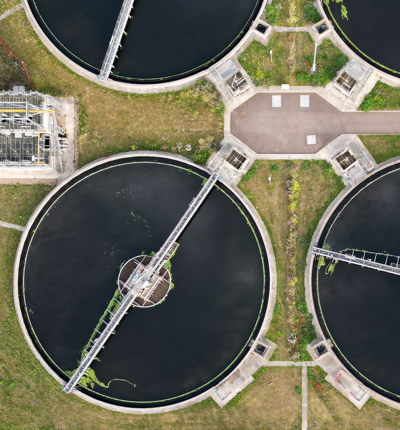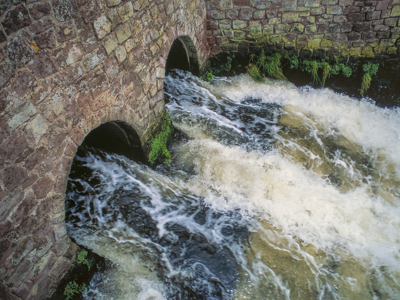
Fighting Dirty challenges Environment Agency over axing of pledge to test sewage sludge agricultural fertiliser for land contaminants
Environmental campaign group Fighting Dirty has launched a legal challenge to the Environment Agency (EA) over its decision to axe a commitment to bring the regulation of sewage sludge into the Environmental Permitting Regime by 2023.
Posted on 09 November 2023
This would require sewage sludge to be tested for microplastics and forever chemicals before being applied to agricultural land as fertiliser.
The group has applied for judicial review of a change to EA’s Strategy for Safe and Sustainable Sludge Use. The change removes the 2023 deadline to introduce new legislation for the regulation of sludge, including to require stronger testing for the 3.5 million tonnes of sludge that is spread on UK agricultural land as fertiliser every year. As a result, there is now no timetabled end to stopping sludge harming the environment in this way.
Fighting Dirty, which comprises campaigners Georgia Elliott-Smith, George Monbiot and Steve Hynd, is represented by the environment legal team at Leigh Day.
Sewage sludge is the solid matter left over from the process of treating sewage at sewage treatment plants and in septic tanks. Contaminants that have not been removed by the sewage treatment process are contained in the product that is sold to farmers by water companies for use as fertiliser. These contaminants are harmful to both the environment and humans.
A report commissioned by the Environment Agency (EA) in 2017 found English crops contaminated with dangerous organic contaminants including dioxins, furans, and polycyclic aromatic hydrocarbons at “levels that may present a risk to human health” and physical contaminants including plastics that could result in “soils becoming unsuitable for agriculture”.
The Secretary of State for the Environment, Food and Rural Affairs, who would need to promote the necessary new legislation, has been named as an interested party in the judicial review claim.
In 2020, the EA published a strategy for safe and sustainable sludge use stating that regulations would be introduced by mid-2023, bringing testing and regulation of sludge into the Environmental Permitting Regime (EPR). However, the 2023 deadline was removed from an updated version of the strategy published in August 2023, with no alternative timescale introduced.
In its application for judicial review, Fighting Dirty argues the Environment Agency, in making the decision to update the Strategy, has failed to consider mandatory relevant factors and to make sufficient inquiries, and that its decision not to replace the target date is irrational.
George Monbiot said:
“It strikes me as a classic example of an issue that almost everyone has ignored, which turns out to be more important than many of those over which we obsess. The total failure of effective regulation in this case suggests that there is little ecological difference between dumping raw sewage into rivers – as water companies routinely and disgracefully do – and spreading contaminated sludge over farmland. Worse in fact, as the sludge poisons the soil before seeping into waterways.
“The rules are at fault. By failing to update them, and by suppressing and ignoring the evidence of its own officials, the government is in breach of its legal obligations to protect the living world and human health.”
Georgia Elliott-Smith said:
"By removing the deadline for introducing regulations on the safe and sustainable use of sludge, the EA has effectively reverted to a ‘do nothing’ position – something they originally stated was unacceptable to protect human and environmental health.
“Farmers are unknowingly being sold potentially highly toxic material to spread on their land, poisoning our soil, watercourses, and food, and we have no hope of a date when this situation will be resolved. It is unacceptable to be left in limbo like this.”
Steve Hynd, Policy Manager at not-for-profit City to Sea added:
“Microplastics are the hidden environmental crisis of our age. They’re buried meters deep in Antarctic sea ice cores, they’re found within the guts of marine animals inhabiting the deepest ocean trenches, and they’re found on the peaks of the highest mountains. Increasingly we know that they’re in the air we breathe, the food we eat and liquids we drink. The idea that we are spreading them directly onto farmland without regulation or control is horrifying. It represents a dereliction of duty from those that are meant to be regulating this sector.”
Leigh Day solicitor Julia Eriksen said:
“The EA has known about the dangerous level of contamination that exists in sludge since 2017 and has acknowledged that doing nothing is not an acceptable option. In these circumstances, our client says removing any target date for implementing regulatory change is unacceptable. Our client has not been shown any evidence that an alternative date for implementation is being considered. Our client is deeply concerned by the continued delay to taking necessary regulatory action to mitigate the harm this practice is causing to our agriculture land, the wider environment and human health.”
Fighting Dirty is crowdfunding its legal claim.

First environmental collective action claim launched on behalf of millions of customers overcharged by water companies
A legal claim has been issued against one of six UK water companies who are facing legal collective actions for allegedly abusing their dominant market position by underreporting the number of times they cause pollution incidents and overcharging customers as a result.



